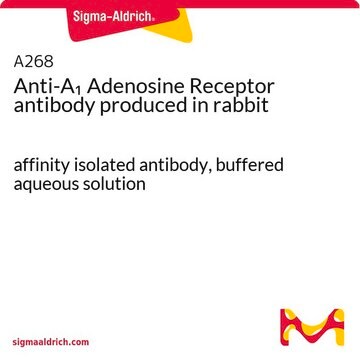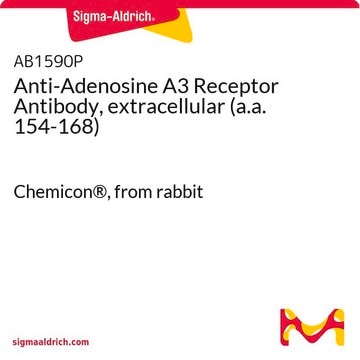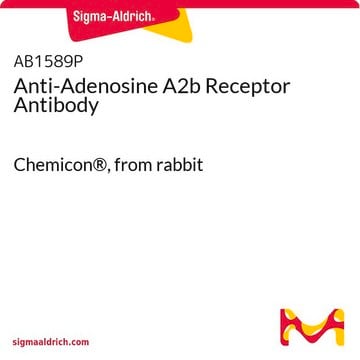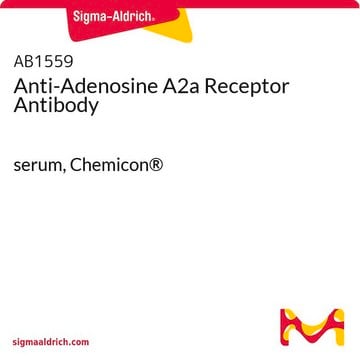AB1587P
Anti-Adenosine A1 Receptor Antibody
Chemicon®, from rabbit
About This Item
Productos recomendados
origen biológico
rabbit
Nivel de calidad
forma del anticuerpo
affinity purified immunoglobulin
tipo de anticuerpo
primary antibodies
clon
polyclonal
purificado por
affinity chromatography
reactividad de especies
human, rat, sheep, guinea pig, pig
fabricante / nombre comercial
Chemicon®
técnicas
ELISA: suitable
immunocytochemistry: suitable
immunohistochemistry: suitable
western blot: suitable
Nº de acceso NCBI
Nº de acceso UniProt
Condiciones de envío
dry ice
modificación del objetivo postraduccional
unmodified
Información sobre el gen
human ... ADORA1(134)
Especificidad
Inmunógeno
Aplicación
Immunocytochemistry: Caufield, 2003. Light 2% PFA fixation 5-10 minutes --long fixations lower staining intensity.
Western blot: 1-10 μg/mL (Chemiluminescence technique): Membrane preparations are recommended for enhanced signals {Smith et al (2001) Biochem Pharmacology 61:237-244} Higher concentrations of the antibody may be necessary if calorimetric detection or milk-based antibody diluent are used.
ELISA: 1:10,000-1:50,000 (50-100 ng A1R peptide (Cat. Number AG289)/well)
Optimal working dilutions must be determined by end user.
Neuroscience
Neurotransmitters & Receptors
Circadian Rhythm & Sleep
Descripción de destino
Forma física
Almacenamiento y estabilidad
Nota de análisis
Brain tissue
Otras notas
Información legal
Cláusula de descargo de responsabilidad
¿No encuentra el producto adecuado?
Pruebe nuestro Herramienta de selección de productos.
Código de clase de almacenamiento
10 - Combustible liquids
Clase de riesgo para el agua (WGK)
WGK 2
Punto de inflamabilidad (°F)
Not applicable
Punto de inflamabilidad (°C)
Not applicable
Certificados de análisis (COA)
Busque Certificados de análisis (COA) introduciendo el número de lote del producto. Los números de lote se encuentran en la etiqueta del producto después de las palabras «Lot» o «Batch»
¿Ya tiene este producto?
Encuentre la documentación para los productos que ha comprado recientemente en la Biblioteca de documentos.
Nuestro equipo de científicos tiene experiencia en todas las áreas de investigación: Ciencias de la vida, Ciencia de los materiales, Síntesis química, Cromatografía, Analítica y muchas otras.
Póngase en contacto con el Servicio técnico







